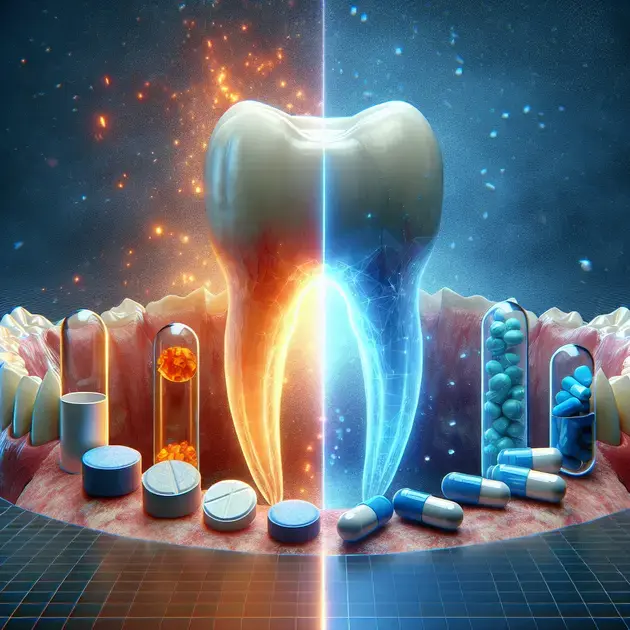When it comes to tackling periodontitis, finding the best medication is crucial for effective treatment. In this comprehensive guide, we will explore the top medications available to combat this common dental issue.
Periodontitis, also known as gum disease, affects a large portion of the population and can lead to serious oral health complications if left untreated. Stay informed with our detailed overview of the best medications to address periodontitis and achieve optimal dental health.

Understanding Periodontitis and Its Effects
Periodontitis is a serious gum infection that damages the soft tissue and destroys the bone that supports your teeth. If left untreated, periodontitis can lead to tooth loss and other serious health issues. Understanding the causes and effects of periodontitis is crucial for effective treatment and prevention.
One of the main causes of periodontitis is poor oral hygiene. When plaque builds up on your teeth and hardens into tartar, it can lead to gum inflammation and infection. Other risk factors for periodontitis include smoking, genetics, diabetes, and certain medications.
To prevent and treat periodontitis, it is important to practice good oral hygiene, including brushing your teeth twice a day, flossing daily, and visiting your dentist regularly for check-ups and cleanings. Additionally, making healthy lifestyle choices such as avoiding tobacco and eating a balanced diet can help reduce your risk of developing periodontitis.
Early signs of periodontitis include red, swollen, or bleeding gums, bad breath, and loose teeth. If you notice any of these symptoms, it is important to seek professional dental care immediately. Your dentist can assess the severity of your periodontitis and recommend appropriate treatment options, which may include deep cleaning, antibiotics, and surgical procedures.
By understanding the causes and effects of periodontitis and taking proactive steps to prevent and treat the condition, you can protect your oral health and overall well-being.
Choosing the Right Medication for Gum Disease
When it comes to treating gum disease, choosing the right medication is essential for achieving optimal results. There are several types of medications available for gum disease, including over-the-counter options and prescription-strength treatments. Understanding the differences between these medications and their potential side effects can help you make an informed decision about your oral health.
One common medication for gum disease is chlorhexidine mouthwash, which is available by prescription. Chlorhexidine is an antiseptic that helps reduce the amount of bacteria in your mouth, leading to healthier gums and decreased inflammation. To obtain chlorhexidine mouthwash, you will need to consult with your dentist or periodontist for a prescription.
Another medication option for gum disease is antibiotic therapy, which may be prescribed in the form of oral antibiotics or antibiotic gels. These medications are used to target and eliminate harmful bacteria that contribute to gum inflammation and infection. Your dentist will determine the most appropriate antibiotic therapy based on the severity of your gum disease.
In addition to prescription medications, over-the-counter options such as fluoride toothpaste and antiseptic mouthwashes can help support your gum health and prevent further progression of gum disease. These products are readily available at pharmacies and grocery stores, making them convenient choices for daily oral care.
Before starting any medication for gum disease, it is important to consult with your dentist or healthcare provider to discuss your treatment options and ensure proper use of the medication. Your dentist can evaluate your oral health needs and recommend the most effective medication for your specific condition.

Top Medications for Periodontitis Treatment
Periodontitis is a serious gum infection that damages the soft tissue and destroys the bone that supports your teeth. If left untreated, periodontitis can lead to tooth loss and other health problems. The best way to treat periodontitis is by using a combination of medications, professional dental cleanings, and good oral hygiene practices. Here are some of the top medications for treating periodontitis:
1. Antibiotics
Antibiotics are often prescribed to treat periodontitis. They can help kill the bacteria that cause the infection and reduce inflammation in the gums. Common antibiotics used to treat periodontitis include doxycycline, tetracycline, and metronidazole. These medications are usually taken orally or applied directly to the gums.
In some cases, your dentist may also prescribe antibiotics in the form of a mouth rinse or gel. It’s important to follow your dentist’s instructions carefully when taking antibiotics to ensure the infection is properly treated.
2. Antiseptic Mouthwash
Antiseptic mouthwashes contain ingredients that can help reduce plaque buildup and kill bacteria in the mouth. Using an antiseptic mouthwash regularly can help prevent gum disease and reduce the severity of periodontitis. Look for a mouthwash that contains ingredients like chlorhexidine or cetylpyridinium chloride for the best results.
It’s important to note that antiseptic mouthwash is not a substitute for professional dental care. While it can help control gum disease, it should be used in conjunction with regular dental cleanings and good oral hygiene practices.
3. Prescription-strength Toothpaste
Prescription-strength toothpaste may be recommended by your dentist to help manage periodontitis. These toothpastes often contain special ingredients like triclosan or stannous fluoride, which can help reduce plaque and inflammation in the gums. Using a prescription-strength toothpaste as part of your daily oral hygiene routine can help improve the health of your gums and prevent further damage.
Be sure to follow your dentist’s instructions when using prescription-strength toothpaste, and continue to brush and floss regularly for optimal results.
4. Pain Relievers
If you are experiencing pain or discomfort due to periodontitis, your dentist may recommend over-the-counter or prescription-strength pain relievers. Medications like ibuprofen or acetaminophen can help reduce pain and inflammation in the gums, making it easier to eat and speak comfortably. It’s important to only use pain relievers as directed by your dentist to avoid any potential side effects.
Remember, pain relievers are a temporary solution and should not replace proper treatment for periodontitis. Make sure to follow up with your dentist regularly to monitor the progress of your treatment and adjust medications as needed.
Conclusion
Periodontitis, a severe gum infection, can have detrimental effects on oral health if left untreated, leading to tooth loss and other complications. The effective treatment of periodontitis involves a multifaceted approach, including the use of medications, professional dental cleanings, and proper oral hygiene practices.
Antibiotics
Antibiotics play a crucial role in combating periodontitis by eliminating the bacteria responsible for the infection and reducing gum inflammation. Common antibiotics such as doxycycline, tetracycline, and metronidazole are commonly prescribed either orally or topically. It is essential to adhere closely to the dentist’s instructions when taking antibiotics to ensure the infection is properly addressed.
Antiseptic Mouthwash
Regular use of antiseptic mouthwashes can aid in preventing gum disease and alleviating the severity of periodontitis by reducing plaque buildup and eliminating bacteria in the mouth. Look for mouthwashes containing ingredients like chlorhexidine or cetylpyridinium chloride for optimal results. It is important to remember that while mouthwash can help control gum disease, it should complement professional dental care and good oral hygiene habits.
Prescription-strength Toothpaste
Prescription-strength toothpaste, enriched with ingredients like triclosan or stannous fluoride, can assist in managing periodontitis by reducing plaque and inflammation in the gums. Incorporating prescription toothpaste into your daily oral care routine can enhance gum health and prevent further damage. Adhering to your dentist’s instructions and maintaining regular brushing and flossing habits are essential for optimal outcomes.
Pain Relievers
In cases of discomfort or pain associated with periodontitis, dentists may recommend over-the-counter or prescription-strength pain relievers like ibuprofen or acetaminophen. These medications help alleviate pain and inflammation in the gums, facilitating comfortable eating and speaking. It is crucial to use pain relievers as directed by your dentist and not as a substitute for proper periodontitis treatment. Regular follow-ups with your dentist are necessary to monitor treatment progress and make any necessary medication adjustments.
.



